I read a few nonfiction titles in 2020, but the pandemic drove me to seek escape in novels: fiction, science fiction, horror, and thrillers. These are my reviews of the ten books I most enjoyed this year. All were solid four- and five-star reads.
“Not much has been written, and I hope never will be, about agents who devote the best years of their lives to spying for us, take their salaries and bonuses and golden handshakes, and without fuss, without being exposed or defecting, retire to a peaceful life in the country they have loyally betrayed, or some equally benign environment.”
— John le Carré, Agent Running in the Field
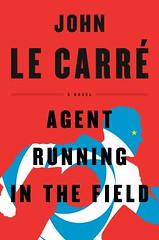 Agent Running in the Field
Agent Running in the Field
by John le Carré
From my review of an earlier le Carré novel, “A Delicate Truth”:
You can feel le Carré’s anger with the direction covert intelligence gathering has taken since the days when the Americans, led by Dick Cheney and his puppet George W. Bush, subverted and politicized the process, dragging Britain’s spy services down with them into a Keystone Kop mess of cherry-picking intelligence from favored sources, special rendition, torturing innocent and guilty suspects alike, and achieving nothing but failure after failure. Le Carré’s anger shines with a special intensity when he describes the yes-man atmosphere within Britain’s intelligence services today, and it shines with blinding intensity during the chapter where former foreign office official Kit Probyn tries to alert his former colleagues to a disastrously failed mission he was once part of.
I see echoes of that anger in le Carré’s latest novel. Things have changed since the days of GWB and Cheney, but not overmuch; the yes-men show up in force when they interrogate Nat about his political sympathies, turning blank and unsmiling faces toward him when he describes his opposition to Trump and Brexit.
As in the best of the more recent le Carré novels, his spy protagonist is able to work outside the political constraints of his service to achieve a greater good … at great personal expense, of course.
John le Carré is incredibly good. He has lost none of his power with age. I’m younger than he is, and can still call up and describe my feelings as a middle-aged man at the peak … and just past the peak … of my professional career. Should I survive into my late 80s, will the longer view that comes with age get in the way of my ability to recall those feelings with the same intensity? Age is simply irrelevant with le Carré. When he writes about espionage, he’s back in the life as if he’d never left it. Everything he writes is immediate and believable.
This is a gripping read. Once I reached the mid-point I ignored all further distractions and finished it in one sitting.
“’They’re still a bit in advance of the pandemics, at least.’ She took the seat opposite. ‘Nothing before the 2020s has ever seemed entirely real, to me. Hard to imagine they weren’t constantly happy, given all they still had. Tigers, for instance.’”
— William Gibson, Agency
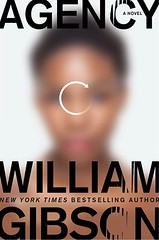 Agency (Jackpot #2)
Agency (Jackpot #2)
by William Gibson
Fans waited patiently for this one, reportedly while Gibson altered an already-complete manuscript to account for Trump’s unexpected (to him) election and the disruptions it’s bringing about. IMO he handled it beautifully in “Agency”: in Verity and Eunice’s stub, Hillary Clinton is president, Trump an unpleasant memory (notably, the memory that haunts Gibson’s characters is that of Trump looming threateningly behind Hillary during one of the debates). Trump’s election, in another stub, is almost unfathomable to the inhabitants of “Agency,” both present and future.
Which in itself is a perfect illustration of bifurcating timelines, here called stubs (they were shunts in the first novel of this planned trilogy, “The Peripheral”). I was happy to get back into the universe of “The Peripheral” and its future characters, old friends by now, still meddling in the past and creating new timelines.
Eunice, the autonomous AI, so evoked thoughts of Wintermute in Gibson’s long-ago first novel “Neromancer” I started re-reading an old copy I had laying around to make sure I wasn’t mistaken. I was not.
It is not for me to try to explain the storyline. You get Gibson or you don’t. But I will offer a few comments on parts of “Agency” that stick in my mind:
– For a novel titled “Agency,” the main character Verity and most of the supporting cast exercise very little of it. Everything is scripted by Eunice, and to a lesser degree by a mega-wealthy tech celebrity named Stet. The rest of us are merely along for the ride.
– Eunice and Stet’s ability to orchestrate events, to mobilize dozens of aides and assistants to be in just the right place at just the right time (mostly to hide or rescue Verity from the forces arrayed against her) was the most unbelievable part of this novel. Magical, when you get right down to it. People fuck up; always have. They don’t here.
– The McWolven joins Michael Chabon’s Filipino donut on my list of fictional foods to sample in the afterlife.
In my 2015 review of “The Peripheral” I said the new trilogy might bump Gibson’s Bridge trilogy to second place on my list of Gibson favorites. I am slightly less enthusiastic about “Agency” than I was about “The Peripheral.” For now, the Bridge trilogy stays on top.
I’ll add two general-purpose observations from my earlier reviews of Gibson novels:
Gibson likes complex stories with interrelated events and characters. He’s a student of pop culture, and his novels are right on top of current trends. Even more than complexity and hipness, I think, he likes happy endings. Some say he’s a sentimentalist, but I don’t think hipness has to be dark.
There’s a strong strain of intellectual curiosity behind Gibson’s near-future stories, which always makes for good science fiction, but what I like best about his story-telling is that he leaves it to the reader to figure things out.
“That’s the thing about autocracy. It looks pretty decent while it still looks pretty decent. Survivable, anyway. And it keeps looking like that right up until it doesn’t. That’s how you find out it’s too late.”
— James S.A. Corey, Tiamat’s Wrath
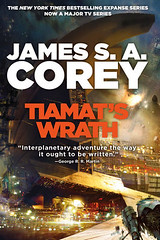 Tiamat’s Wrath (The Expanse #8)
Tiamat’s Wrath (The Expanse #8)
by James S.A. Corey
I started watching the Syfy Channel’s “The Expanse” television series a couple of years after reading the first two Expanse novels, “Leviathan’s Wake” and “Caliban’s War.” I recently finished watching the fourth season (now on Amazon), which parallels the action of the 4th novel, “Cibola Burn,” set on Ilus, the first exoplanet to be colonized.
I’ll start my review by repeating what I said after reading the first book, “Leviathan’s Wake”:
I must say, I thoroughly enjoyed this example of good old-fashioned space opera. It’s set in a distant enough future that mankind has spread through the solar system, inhabiting the Moon, several asteroids, Mars and its moons, and some of the moons of the gas giant planets. There are three major political alliances, all at odds with each other: the Earth and Moon, Mars, and the Outer Planet Alliance (the Belt). Although Mars is being terraformed, it is centuries away from being able to sustain human life on its own, and of course inhabitants of the Belt depend on constant resupply to stay alive. The story itself is quite dramatic, involving the discovery of a hostile alien protomolecule capable of wiping out ? or drastically changing the very cellular structure of ? humanity, and a growing war between the three alliances. One plucky space pirate crew is at the center of the action, and they will remind you of the crew of the Nostromo in Ridley Scott’s seminal movie, Alien. Need I say more? The story will grab you by the nape of the neck and pull you along.
I find it hard to separate the novels from the TV adaptations. Not only are they equally excellent, they are mutually enriching: the TV adaptation enhances the reader’s experience of the novels; the novels add levels and depth to the viewer’s experience of the TV series. I haven’t seen this often. The movie “Master and Commander” managed to add to my love of Patrick O’Brian’s Aubrey-Maturin novels, and HBO’s “His Dark Materials” is off to a great start with its adaptation of “The Golden Compass,” the first novel of Philip Pullman’s trilogy.
I would have loved every novel of “The Expanse” series if the TV adaptation had never existed. But since I also watch and love the TV series, I now see the actors when I follow the characters on the printed page, and with the exception of one or two shortcuts taken by the TV series (example: the actress Cara Gee playing the character Carmina Drummer but also somehow representing another strong character from the novels, Michio Pa), I am totally on board with the TV producers’ choices.
Lovers of science fiction won’t find much to object to in “The Expanse,” the novels or the TV series. I grew up on hard science fiction and it is still my first love. I almost always have wave-the-bullshit-flag moments when reading or watching science fiction; I’ve had only one or two of those in eight novels and four seasons of “The Expanse.”
I can’t say enough good things about the novels (or the TV series). I impatiently wait for the 9th and final (as yet untitled) novel, and I’m delighted that Amazon picked up the torch when Syfy dropped it, and that there will be more seasons to come.
“And how long will the American people stand for this treachery perpetrated by their elected president? How long will Americans remain asleep while their cherished Constitution is torn to shreds.”
— Philip Roth, The Plot Against America
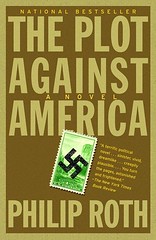 The Plot Against America
The Plot Against America
by Philip Roth
I first read “The Plot Against America” shortly after it was published in 2004. I decided to read it again after watching HBO’s excellent TV adaptation.
I can’t say this novel is Roth’s best work (parts of it are quite windy), but it’s certainly among his most affecting. Roth made it easy to relate to the Levins, and particularly to the two boys, Sandy and Philip. Roth made it easy to accept the idea that Lindbergh could have swept into office in 1940 by running on an anti-war platform.
I grew up in the 1950s, a time when Lindbergh was still a hero to white Christian schoolchildren. Our parents and teachers never talked about Lindbergh’s anti-Semitism or his work for the America First Committee, any more than they talked about Japanese-American concentration camps. Lindbergh was even more America’s hero in the 1930s and 40s, the time the novel is set in, and until Philip and Sandy’s Jewish parents and neighbors turned against Lindbergh, had been a hero to them as well.
The TV adaptation added an interesting twist involving the ne’er-do-well nephew Alvin, a twist not present in Roth’s novel. Did it make for a better story? On the whole, I think it did. Roth wrote Lindbergh away by having him fly off and vanish, never to be seen again, then proffered a few outlandish conspiracy theories to explain the wave of anti-Semitic attacks that swept the country afterward. In the TV adaptation, Alvin is recruited by Canadian agents and participates in a clandestine action that leads to Lindbergh’s disappearance. As in the novel, bizarre conspiracy theories sweep the country and riots ensue, but viewers at least have a clearer explanation for Lindbergh’s disappearance.
Roth’s alternate history is grounded in historical fact and his lived experience growing up in a tight Jewish community in Newark. It’s no stretch at all to imagine the events described in “The Plot Against America” happening in the America of 1940 … nor is it a stretch to imagine them happening in America today.
As I re-read “The Plot Against America” I assumed right-wing Christian parents and school board members around the country have been busy trying to have it taken off library shelves and removed from English class reading lists. Surprisingly, that does not seem to be the case — but I don’t expect it to stay that way.
Roth could not have foreseen the current occupant of the White House, a man who retweets racist and anti-Semitic memes on social media and calls automatic rifle-toting home-grown Nazis “very good people,” but in “The Plot Against America” he created eerily similar characters, in particular the vice president who briefly takes over after Lindbergh’s disappearance, and it can’t be long now — especially with the popularity of HBO’s TV adaptation of “The Plot Against America” — until the book banners get up to their old tricks.
Do watch the show, and do read the book. It’s a potential vaccine against a most pernicious disease. I’m taking my copy to the neighborhood book drop this morning, and hope it starts making the the rounds here.
“I respect secrets, but I would rather have you tell me that something is off-limits than have you give me misinformation. A hole in the data, I can work with.”
— Mary Robinette Kowal, The Relentless Moon
 The Relentless Moon (Lady Astronaut #3)
The Relentless Moon (Lady Astronaut #3)
by Mary Robinette Kowal
From my review of “The Calculating Stars (Lady Astronaut #1):
Pining for some good science fiction, I decided to read one of the 2019 Hugo Award finalists. “The Calculating Stars” surprised me in several ways. The science fiction is almost entirely fact-based, couched in an alternate-timeline world where space exploration — satellites, manned spaceflight, and flights to the moon — developed a few years earlier than in our timeline, spurred by the impact of a large meteorite off the eastern seaboard of the United States, an extinction event forcing mankind to consider the possibility of getting off the planet before it is no longer habitable.
The novel is also a social history, very closely based on our timeline’s history of resistance to racial and gender equality. Quick aside: one of the most interesting parts of the novel, to me, is Mary Robinette Kowal’s afterword, where she compares our actual history and progress with that of the world she built for this novel.
From my review of “The Fated Sky (Lady Astronaut #2):
… as a primer for human factors that will affect astronauts and space voyagers in our timeline, the Lady Astronaut series seems sociologically and scientifically sound, and Mary Kowal, if you read her fascinating afterwords to the novels, shows that she’s done her research: everything she speculates about seems realistic, predictable, and probable.
I eagerly awaited the publication of “The Relentless Moon (Lady Astronaut #3), which I had pre-ordered after finishing “The Fated Sky.” It did not disappoint.
The action in “The Relentless Moon” occurs on Earth and the Moon while the Mars mission that was the subject of “The Fated Sky” proceeds in the background (also in the background: Elma York, the lady astronaut herself and narrator of the first two novels in the series). “The Relentless Moon” is told by a secondary character from the first two novels, Nicole Wargin, who despite her age (50) and political role as wife of the governor of Kansas, is still active in the space program and becomes the key player in unraveling a Luddite plot to sabotage and end the space program.
The action is riveting and the science is as good as it gets. As with the first two novels, the alternate timeline is so very close to our own I sometimes felt part of Mary Robinette Kowal’s fictional world, as if I’d awakened from a fitful sleep and realized we actually did get hit by a meteor and start going to space in the 1950s. As with the first two novels, social history and change is as important as space exploration, and once again the author’s afterword adds immeasurable value to the novel itself.
The three novels are as much about our own timeline and history as they are of a fictional, post-meteor world’s; this one was the best yet. I hope it isn’t the last.
“Father Travis wore cassocks most of the time because he liked the convenience. He could put them on over T-shirts and work pants. The old people liked to see him in one, and after The Matrix the young people liked it too.”
— Louise Erdrich, LaRose
 LaRose
LaRose
by Louise Erdrich
My book club decided to read a work by a Native American woman for August 2020. We picked “LaRose” from a short list of titles. I’d been on a pleasure reading jag, devouring thrillers, mysteries, police procedurals, and science fiction, and didn’t think I’d get into this novel at all. Boy, was I wrong.
It may have helped that I lived in Northeastern Montana for a year, just outside the Fort Peck Indian Reservation, working with a mix of white and Native American adults. I easily fell into the vibe of the novel’s North Dakota setting, with the town of Pluto and its nearby reservation. What made me feel most at home, though, were Erdrich’s vividly drawn and sympathetic characters.
I’m generally cold to magic realism in fiction, but so much of Native American spirituality seems, to an outsider like me, both magical and real, and in the context of this novel’s story right, proper, and essential — especially in telling the story of LaRose and the generations of LaRoses who came before him.
Short passages about the life of the first LaRose, born in the 1830s, are interspersed throughout the main narrative, which follows the lives of the current LaRose and the families who raise him in the early 2000s. Those passages were a major pull, and I eagerly looked forward to them. I had forgotten about the Year 2000 panic; Peter Ravich’s losing gamble on having his debts erased and forgotten on the stroke of midnight, January 1st, 2000, were a welcome touch of humor, as was the addled scheming of Romeo (and the revenge taken on him by the elderly women in the reservation’s assisted living facility). Nola and Maggie — my god, what great characters. Well, hell, they all are.
There aren’t many novels I’m sad to see end. This one could have gone on and on.
“All I could think of when I got a look at the place from the outside was what fun it would be to stand out there and watch it burn down.”
— Shirley Jackson, The Haunting of Hill House
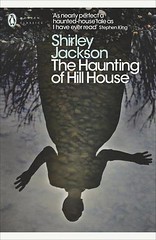 The Haunting of Hill House
The Haunting of Hill House
by Shirley Jackson
Members of my book club chose this horror classic for our October 2020 read. I have of course read “The Lottery,” but until now that was my only acquaintance with Shirley Jackson. After “The Haunting of Hill House,” I will likely read more.
The edition I read starts with an almost 30-page academic guide, which I skipped over to get to the story. I might have read and appreciated it as an afterword, but as a preface it only got in the way.
The more I think about Eleanor, or Nell, the more ambiguities I see — she’s the perfect match for Hill House and I’ll go to my grave believing she lives there still. We learn so much about the four main characters who take up temporary residence there, but about none so much as Eleanor (though I did enjoy the hints of lesbianism in Theodora, a forbidden topic at the time Shirley Jackson wrote the novel).
Horror stories in general leave me cold, but I’m all in for Hill House, a masterpiece of the genre with its blend of hints and specificity, of details and startling facts slowly revealed as the plot advanced. I keep coming back to Eleanor, and there’s a reason: my entire perception of her changed over the course of the book, and even now, a full day after finishing it, is still changing. I can’t wait for the book club discussion to see if other members were as affected by her as I was.
“Ugh, emotions.”
— Martha Wells, Network Effect
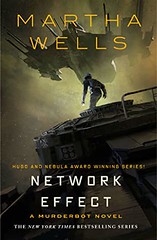 Network Effect (The Murderbot Diaries, #5)
Network Effect (The Murderbot Diaries, #5)
by Martha Wells
From my review of “All Systems Red (Murderbot Diaries #1)”:
I was delighted with this introduction to the Murderbot. I generally don’t expect much of novellas, but this one is meaty and fulfilling. There’s a lot of gee whiz science fiction here, on an alien planet no less, along with interesting world-building about future human societies, but true to the series title, “The Murderbot Diaries,” it’s told on a chatty, personal level by the very human Murderbot itself, and though it would wince at my praise, Murderbot is a first-rate story-teller. Based on this first read, I expect the overall Murderbot series to be a great, fun experience.
“Network Effect” is the first novel-length Murderbot story in the series, and the best I’ve read to date. I’ll note that I’m reading the series in order and recommending other readers do the same, because each new novella (or novel, in this case) contains multiple references to events, encounters, and lessons learned in previous installments.
Everything about the story in “Network Effect” justifies it being a full-length novel. Readers who’ve grown fond of the Murderbot will enjoy its continued personal growth as it goes on a mission with members of its extended human family from the Preservation alliance and meets (or is abducted by) other old friends and associates along the way. Although “family” and “friends” are words Murderbot itself would never use.
“Growing” is key to my enjoyment of this series. I loved Lee Childs’ Jack Reacher series as well. Read every one of them in order, just as I’m doing with Murderbot. No one can say Jack Reacher grows. Murderbot is constantly evolving and is full of surprises.
I wondered if Martha Wells talked to military aviators … fighter pilots in particular … as background research for this novel. We too classify newly acquired entities as “contacts” and “targets,” usually instantly. I feel closer to Murderbot with each new installment.
The closing chapter of “Network Effect” sets the stage for some great sequels, and it’s all I can do to pace myself and read the other books waiting on my shelf and my Kindle. I’ll be back, and soon.
“We shouldn’t automatically oppose everything. I mean, what makes us so fucking smart? We’re the beneficiaries of people before us figuring out shit that makes our lives better or helps us live longer. Why stop now, just because we think we know it all?”
— C.J. Box, Free Fire
 Free Fire (Joe Pickett #7)
Free Fire (Joe Pickett #7)
by C.J. Box
I’m reading C.J. Box’s Joe Pickett novels, which are set in a mountainous, sparsely-populated corner of Wyoming and feature a fish & game warden who finds himself and his family threatened by bad men intent on raping the West. They’re great reads, engrossing and impossible to put down, and I’m devouring the series.
It’s difficult to write meaningful reviews of individual novels in a series. Unless I have something urgent to say about individual Joe Pickett novels, I’ll repeat what I said about “Open Season,” the first novel in the series:
As much as I enjoy reading Lee Childs’ Jack Reacher stories, Jack is a superhero, a figure of fantasy. When Jack Reacher gets even, people die … but not before a righteous ass-kicking. While C.J. Box brings on Reacheresque tension and villainy, when it comes to his human and relatable hero Joe Pickett, it’s more a matter of luck. Joe prevails, a believable form of getting even. But don’t worry. Asses do get kicked, in satisfying ways. I really like this Pickett guy. He makes mistakes, and plenty of them. He worries about money. He trusts people he shouldn’t. He’s a regular Joe. I really like the depictions of Wyoming, a state I lived in as a teenager and remember fondly. Joe, at least in this first novel, has an almost-too-perfect family, but there are tensions, and I sense troubled teenage years ahead for his daughter Sheridan. Granted that everything in this novel is fiction, it feels real and true.
“Free Fire,” the 7th installment of the Joe Pickett series, is the most educational of the novels so far, and I don’t say that to drive potential readers away. The action takes place inside Yellowstone National Park, with Joe, reinstated as a Wyoming game warden, working as an unwelcome intruder on federal land, tasked by the governor to investigate a mass murder that eventually reveals corruption at high levels and puts his own life and that of his family in jeopardy. Great action, a fascinating plot based in reality, and a tremendous hook at the end involving Joe’s unofficial, undercover, off-the-books, gunslinging sidekick Nate Romanowski. Which is to say once you’ve read the 7th Joe Pickett novel, you have to read the 8th. If it’s half as good as this one, it’ll be another gripping read.
As an aside, I published my review of the 6th Joe Pickett novel on Daily Kos, where it drew this comment:
I had to stop reading C.J.Box a couple of books back. I liked Joe Pickett well enough but as a Canadian & a gun control activist (& someone who was born & raised in Alberta ranch country), I find Box’s glorification of guns & violence as the answer to everything that’s wrong in your world & “the cowboy way” (which seems to mean a lot of revenge porn & strident red, white & blue jingoism masquerading as patriotic heroism) pretty hard to take.
To which I respond: “Well, duh!”
“’You’re not Dostoevsky,’ said the citizeness, who was getting muddled by Koroviev.
‘Well, who knows, who knows,’ he replied.
‘Dostoevsky’s dead,’ said the citizeness, but somehow not very confidently.
‘I protest!’ Behemoth exclaimed hotly. ‘Dostoevsky is immortal!’”
— Mikhail Bulgakov, The Master and Margarita
 The Master and Margarita
The Master and Margarita
by Mikhail Bulgakov
This was my book club’s selection for December 2020.
Another reviewer says this:
The novel’s vision of Soviet life in the 1930s is so ferociously accurate that it could not be published during its author’s lifetime and appeared only in a censored edition in the 1960s. Its truths are so enduring that its language has become part of the common Russian speech.
True enough that Bulgakov’s novel couldn’t be published in his lifetime, then only in censored form when finally printed in 1960. But I’m befuddled by the reviewer’s “ferociously accurate” comment, because as an American child of the Cold War, I was raised to believe Soviet life in the 1930s was infinitely worse than the life depicted in “The Master and Margarita,” more akin to Orwell’s “1984” than this comic romp through the bourgeois lives of middle- and upper-class Muskovites.
They had nomenklatura under Stalin in the 1930s? Who took cabs to the theatre and restaurants? Who lusted after French fashion? Who were petty and motivated by greed, like anyone anywhere? Who didn’t live in constant fear of informers and secret police? Who didn’t fear a knock on the door in the middle of the night? Who knew?
Oh, yes, some vague hints of Soviet grimness are here. There are plenty of police, though not of the Chekist variety. The state seems very concerned with what its citizens may be up to, particularly the hoarding of foreign currency. Atheism is the approved religion, yet poets and writers aren’t fearful of openly discussing religious subjects. But all in all, the lives of the Master and Margarita are recognizable to Westerners.
Notably not present in Bulgakov’s masterpiece: the lives of Soviet citizens outside Moscow. Where are the communes? The peasants? The widespread privation and starvation?
I’m not saying I didn’t love “The Master and Margarita.” I couldn’t put it down. It’s a comic masterpiece. But I think some readers make too much of three words spoken by Satan and his comrades: “manuscripts don’t burn.” This is no “Fahrenheit 451.” This is no “One Day in the Life of Ivan Denisovich.” I don’t think Bulgakov’s intent was to write a subversive novel with secret meanings to be teased out between the lines. I think “The Master and Margarita” is just what it appears to be: Bulgakov having fun retelling the stories of Faust and Pontius Pilate.